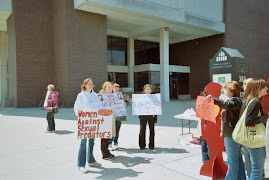12:00 AM CST on Monday, March 3, 2008
COLUMBIA, Miss. – The Columbia Training School – pleasant on the outside, austere on the inside – has been home to 37 of the most troubled young women in Mississippi.
If some of those girls and their advocates are to be believed, it is also a cruel and frightening place.
The school has been sued twice in the past four years. One suit brought by the U.S. Justice Department, which the state settled in 2005, claimed detainees were thrown naked in to cells and forced to eat their own vomit. The second one, brought by eight girls last year, said they were subjected to "horrendous physical and sexual abuse." Several of the detainees said they were shackled for 12 hours a day.
These are harsh and disturbing charges, but they aren't uncommon.
Across the country, in state after state, child advocates have deplored the conditions under which young offenders are housed – conditions that include sexual and physical abuse and even deaths in restraints. The U.S. Justice Department has filed lawsuits against facilities in 11 states for supervision that is either abusive or harmfully lax and shoddy.
In Texas, the juvenile detention system has been churning for more than a year, following allegations of sexual abuse in several facilities. The Texas Youth Commission has had four executive directors in a year, a fifth left in February.
Even though abuse reports are nationally widespread, a lack of oversight and accepted standards for tracking abuse make it difficult to know exactly how many youngsters have been assaulted or neglected.
The Associated Press contacted each state agency that oversees juvenile correction centers and asked for information on the number of deaths as well as the number of allegations and confirmed cases of physical, sexual and emotional abuse by staff members since Jan. 1, 2004.
According to the survey, more than 13,000 claims of abuse were identified in juvenile correction centers around the country from 2004 through 2007 – a remarkable number, given that there were about 46,000 detainees when the states were surveyed in 2007.
Just 1,343 of those claims of abuse were confirmed by various authorities. Of 1,140 claims of sexual abuse, 143 were confirmed by investigators.
Experts say only a fraction of the allegations are ever confirmed. These are some of the most troubled young people in the country and some will make up stories. But in other cases, the youths are pressured not to report abuse; often, no one believes them anyway.
Undoubtedly, juvenile correction facilities and their programs benefit many of the youths who experience them by offering substance abuse programs, educational courses and mental health counseling. And for many troubled youths, the facilities are the last hope to straighten out problems that could eventually lead them to suicide, prison or other institutions.
Still, advocates for the detainees contend that abuse by guards remains a major problem and that authorities aren't doing enough to address the situation.
In 2004, the U.S. Justice Department uncovered 2,821 allegations of sexual abuse by juvenile correction staffers. The government study included 194 private facilities, which likely accounts for the higher numbers than the AP found.
But some experts say the true number of sexual incidents is likely even higher. Some youths view sexual relationships with staff members as consensual, not as adults in positions of authority abusing their power.
There are success stories.
Officials in Missouri, which has one of the most highly regarded juvenile correction systems in the country, agree that it takes more than money to run a safe facility.
"It's just a different approach that we take. It's a treatment approach," said Ana Margarita Compain-Romero, a spokeswoman for the Missouri Department of Social Services. "In other states, they take a more punitive approach, more like corrections."
Holbrook Mohr,
The Associated Press



No comments:
Post a Comment